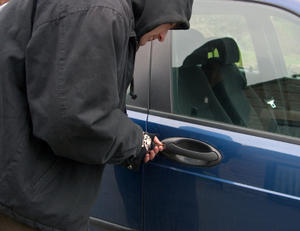Law enforcementAuto theft going extinct?
Thanks to aggressive police work and new technology car theft could eventually become an obsolete problem; new technological developments like high-tech keys, immobilizer systems, and GPS tracking have made it increasingly difficult for thieves to successfully steal cars; new police tactics and technologies like bait cars and license plate scanners have given law enforcement agencies the edge in tracking down stolen cars and catching thieves

Getting in is no longer enough // Source: vehiclevibes.com
Thanks to aggressive police work and new technology car theft could eventually become an obsolete problem.
In recent years new technological developments like high-tech keys, immobilizer systems, and GPS tracking have made it increasingly difficult for thieves to successfully steal cars. Furthermore, new police tactics and technologies like bait cars and license plate scanners have given law enforcement agencies the edge in tracking down stolen cars and catching thieves. As a result of these new developments auto theft in the United States has decreased by more than 40 percent since 2003, far more than any other decrease in criminal activity. According to the FBI, overall crime has dropped since 2003, but nowhere near as much as auto theft. For instance overall violent crime fell ten percent, homicide decreased 12 percent, and burglary remained roughly the same.
Law enforcement officials are not particularly surprised by the statistics as they believe auto theft is something that could eventually be beaten.
“We thought that car theft would be the one kind of crime that lends itself to solving,” said Chuck Wexler, the executive director of the Police Executive Research Forum. “Finally, technology has caught up to the intuitive vision street cops had a decade ago.”
Prince George County, Maryland serves as an example of how aggressive law enforcement can drastically reduce auto theft. In 2004 a car was stolen nearly every thirty minutes and local police began calling car theft an “epidemic.”
“Auto theft didn’t creep up on us, it exploded. We became defined by it. Everyone was talking about it,” said Prince George’s Deputy Police Chief Kevin Davis, head of the patrol bureau. “It can and does happen to anyone, regardless of socioeconomic status. We did drastic things to get a hold of it.”
To stop car thieves, the Prince George police department assigned more detectives on auto theft cases and began using bait cars equipped with surveillance cameras and automatically locking doors. With these rigged vehicles, police would catch criminals in the act by leaving a police-owned automobile in high crime areas with the keys inside, so once a thief made a move, police would be on hand.
In addition, police also began using license plate readers which helped identify stolen vehicles by scanning every plate that it passed. Furthermore police began issuing $55 fines to motorists who left their cars running while they were not in them.
With these tactics, the county’s dedicated auto theft unit began breaking up many car theft rings and low-level street thieves.
These measures have proven effective and by 2010 the number of auto thefts had fallen to 6,052 from 16,332 in 2005.
Police have also been helped by new technologies that make it virtually impossible to hotwire a car. In the past with some vehicles from the late 1990s, thieves could start a car using a screwdriver or a pair of scissors.
“Technology has made it really hard for them,” said Washington, D.C. police chief Cathy L. Lanier. “You can’t hot-wire the newer cars. . . . It’s now harder to steal a car and easier for us to catch you when you do.”
In Washington, D.C. the number of auto thefts has fallen so much, Chief Lanier has reassigned several detectives from her department’s auto-theft unit.
“I’m precise about where I put my people,” Lanier said. “Auto theft was not the biggest problem in the city. I’d rather have those detectives pursuing something else.”
